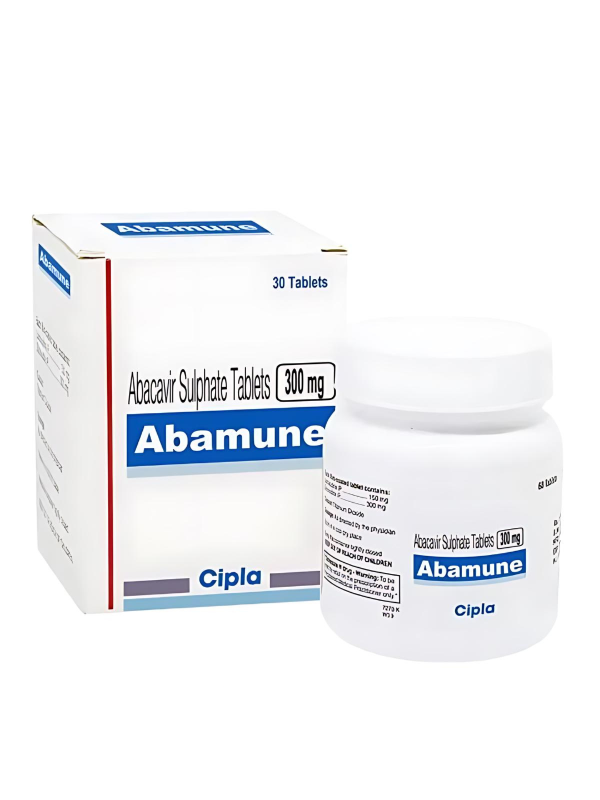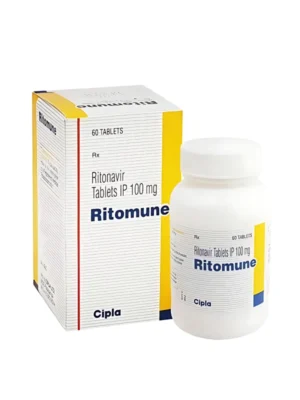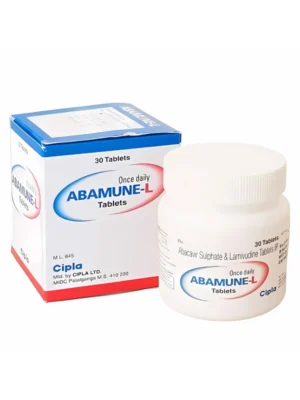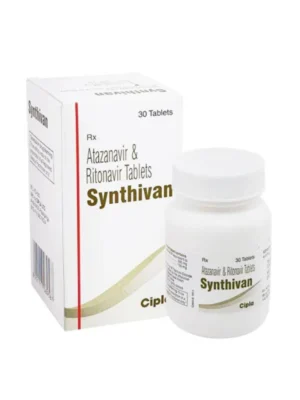Description
Abamune Tablet (Abacavir) – Antiretroviral for HIV & Hepatitis B Treatment
Abamune Tablet is an antiretroviral medication containing Abacavir, used to treat HIV infection and Hepatitis B virus (HBV). As a nucleoside reverse transcriptase inhibitor (NRTI), it works by blocking HIV replication, helping to control the infection and improve immune system function. While not a cure for HIV/AIDS, when taken consistently as part of combination therapy, It significantly reduces viral load, lowers complication risks, and improves life expectancy. The tablet can be taken with or without food, but maintaining a strict dosing schedule is crucial to prevent drug resistance. Common side effects include headache, nausea, and fatigue, though rare but serious hypersensitivity reactions may occur, requiring immediate medical attention.
Uses of Abamune Tablet:
- Treatment of HIV infection (as part of combination therapy)
- Management of Hepatitis B virus (HBV) infection
Benefits of Abamune Tablet:
It effectively reduces HIV viral load, slows disease progression to AIDS, and improves immune function. For HBV patients, it helps control viral replication. When used properly in combination regimens, it significantly enhances quality of life and reduces opportunistic infections.
Side Effects of Abamune Tablet:
-
- Headache
- Nausea & vomiting
- Fever
- Fatigue
- Decreased appetite
- Dizziness
- Muscle pain
- Abdominal pain
- Diarrhea
- Rash
- Sleep disturbances
- ENT infections
- Abnormal liver function tests
Most side effects are mild, but discontinue immediately and consult your doctor if signs of hypersensitivity appear.
How to Use Abamune Tablet?
Take the tablet exactly as prescribed, swallowing whole with water. Maintain consistent dosing times, with or without food. Never crush or chew the tablet.
How Abamune Tablet Works?
It contains Abacavir, which inhibits HIV reverse transcriptase enzyme. This prevents conversion of viral RNA into DNA, effectively stopping HIV replication. For HBV, it interferes with viral DNA polymerase.
Safety Advice:
- Alcohol: Caution advised – may increase liver risk
- Pregnancy: Potentially unsafe – consult doctor
- Breastfeeding: Probably safe (limited data)
- Driving: Safe – typically doesn’t impair alertness
- Kidney Disease: Safe – no dose adjustment needed
- Liver Disease: Use with caution. Avoid in moderate/severe cases
What If You Missed a Dose?
Take the missed dose as soon as remembered. If near the next dose time, skip the missed dose. Never take double doses.
Important Drug Interactions:
Abamune may interact with:
- Fosphenytoin/Phenobarbital/Carbamazepine (reduced effectiveness)
- Interferon alpha (increased liver risk)
- Orlistat (reduced absorption)
Always inform your doctor about all medications you’re taking.
FAQs:
Q1. Can Abamune cure HIV?
No, it controls HIV infection but doesn’t provide a cure. Lifelong treatment is typically necessary.
Q2. What are signs of Abamune hypersensitivity?
Fever, rash, nausea, fatigue, abdominal pain, or respiratory symptoms. Discontinue immediately and seek medical help if these occur.
Q3. Is genetic testing required before taking Abamune?
Yes, HLA-B*5701 screening is recommended as this genetic marker increases hypersensitivity risk.
Q4. Can I stop Abamune if my viral load becomes undetectable?
No. Stopping antiretroviral therapy without medical supervision can lead to viral rebound and resistance.
Q5. How long does Abamune take to work?
Viral load typically decreases within weeks, but immune recovery may take months of consistent treatment.
Q6. Can Abamune be used for PEP (post-exposure prophylaxis)?
No, it’s not approved for HIV prevention after exposure. Other antiretroviral combinations are used for PEP.








There are no reviews yet.